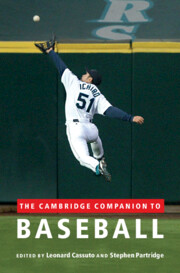Book contents
- Frontmatter
- Introduction
- 1 The rules of baseball
- 2 Baseball in literature, baseball as literature
- 3 Babe Ruth, sabermetrics, and baseball’s politics of greatness
- 4 Not the major leagues: Japanese and Mexican Americans and the national pastime
- 5 Baseball and the color line: from the Negro Leagues to the major leagues
- 6 Baseball and war
- 7 Baseball and the American city
- 8 Baseball at the movies
- 9 The baseball fan
- 10 Baseball and material culture
- 11 Global baseball: Japan and East Asia
- 12 Global baseball: Latin America
- 13 Cheating in baseball
- 14 Baseball’s economic development
- 15 Baseball and mass media
- A guide to further reading
- Index
Introduction
Published online by Cambridge University Press: 28 July 2011
- Frontmatter
- Introduction
- 1 The rules of baseball
- 2 Baseball in literature, baseball as literature
- 3 Babe Ruth, sabermetrics, and baseball’s politics of greatness
- 4 Not the major leagues: Japanese and Mexican Americans and the national pastime
- 5 Baseball and the color line: from the Negro Leagues to the major leagues
- 6 Baseball and war
- 7 Baseball and the American city
- 8 Baseball at the movies
- 9 The baseball fan
- 10 Baseball and material culture
- 11 Global baseball: Japan and East Asia
- 12 Global baseball: Latin America
- 13 Cheating in baseball
- 14 Baseball’s economic development
- 15 Baseball and mass media
- A guide to further reading
- Index
Summary
Pearls Before Swine, a daily comic strip written by Californian Stephan Pastis and syndicated in more than 500 newspapers, ran a series of strips in 2005 in which one of the characters, a bear, goes on a cross-country trip to “try and find the one person who can bring this divided country together.” That person turns out to be Willie Mays. “You were baseball, Mr. Mays,” says the bear. “You were the greatest player in the history of the game and an icon of a past era that somehow seems better than today.”
The bear's view of baseball – and its inverse – lie at the heart of this book. Like many observers, the bear sees baseball as special compared to other games, and he sees baseball's glorified past as mythically different from, yet somehow still deeply connected to, its fallen present. Moreover, baseball history somehow corresponds to American history in the bear's mind: the game's great past is also the nation's. So he thinks the person most qualified to rescue the country is a long-retired baseball player.
This link to national character sets baseball apart from other American sports. It arises from baseball’s much-heralded reputation as the “national pastime,” but the meaning of that epithet is as hazy as that of “American Dream,” another pneumatic concept that fl oats in the same precincts. (“National pastime” is in fact the older of the two terms, dating back to baseball’s nineteenth-century beginnings. “American Dream” was coined during the Depression.) Like “American Dream,” the idea of a national pastime conjures up inchoate yet idealized visions – equal parts myth and pastoral fantasy. These visions always inform, and frequently distort, views of past and present together.
- Type
- Chapter
- Information
- The Cambridge Companion to Baseball , pp. 1 - 8Publisher: Cambridge University PressPrint publication year: 2011



